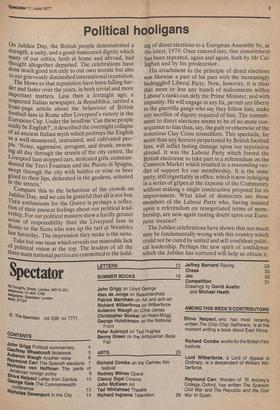Political hooligans
On Jubilee Day, the British people demonstrated a strength, a unity, and a good-humoured dignity which many of our critics, both at home and abroad, had thought altogether departed. The celebrations have done much good not only to our own morale but also to our grievously diminished international reputation. The blows to that reputation have been falling harder and faster over the years, in both trivial and more important matters. Less than a fortnight ago, a respected Italian newspaper, la Repubblica, carried a front-page article about the behaviour of British football fans in Rome after Liverpool's victory in the European Cup. Under the headline 'Can these people really be English?', it described the overnight collapse of an ancient Italian myth which portrays the English as a well-mannered, restrained, and cultivated people. 'Noisy, aggressive, arrogant, and drunk, swarming all day through the streets of the city centre, the Liverpool fans stopped cars, molested girls, commandeered the Trevi Fountain and the Piazza di Spagna, swept through the city with bottles or wine or beer lUed to their lips, defecated in the gardens, urinated in the streets.' Compare this to the behaviour of the crowds on , ubilee Day, and we can be grateful that all is not lost. 1.heir enthusiasm for the Queen is perhaps a reflectl°n of their present feelings about our political lead ership. For our political masters show a hardly greater s,ense of responsibility than the Liverpool fans in Rome or the Scots who tore up the turf at Wembley last Saturday. The impression they make is the same. Take but one issue which reveals our miserable lack of political vision at the top. The leaders of all the three main national parties are committed to the hold ing of direct elections to a European Assembly by, at the latest, 1978. Once entered into, that commitment has been repeated, again and again, both by Mr Callaghan and by his predecessor.
His attachment to the principle of direct elections was likewise a part of his pact with the increasingly bedraggled Liberal Party. Now, however, it is clear that more or less any bunch of malcontents within Labour's ranks can defy the Prime Minister, and with impunity. He will engage in any fix, permit any liberty to the guerrilla gangs who say they follow him, make any sacrifice of dignity required of him. The commitment to direct elections seems to be of no more consequence to him than, say, the guilt or otherwise of the notorious Clay Cross councillors. This spectacle, far more than any horrors perpetrated by British football fans, will inflict lasting damage upon our reputation abroad. It was the Labour Party which forced the British electorate to take part in a referendum on the Common Market which resulted in a resounding verdict of support for our membership. It is the same party, still regrettably in office, which is now indulging in a series of gripes at the expense of the Community without making a single constructive proposal for its improvement. What kind of democrats are those members of the Labour Party who, having insisted upon a referendum on renegotiated terms of membership, are now again casting doubt upon our European treaties?
The Jubilee celebrations have shown that not much may be fundamentally wrong with this country which could not be cured by united and self-confident political leadership. Perhaps the new spirit of confidence which the Jubilee has nurtured will help us obtain it.


































 Previous page
Previous page